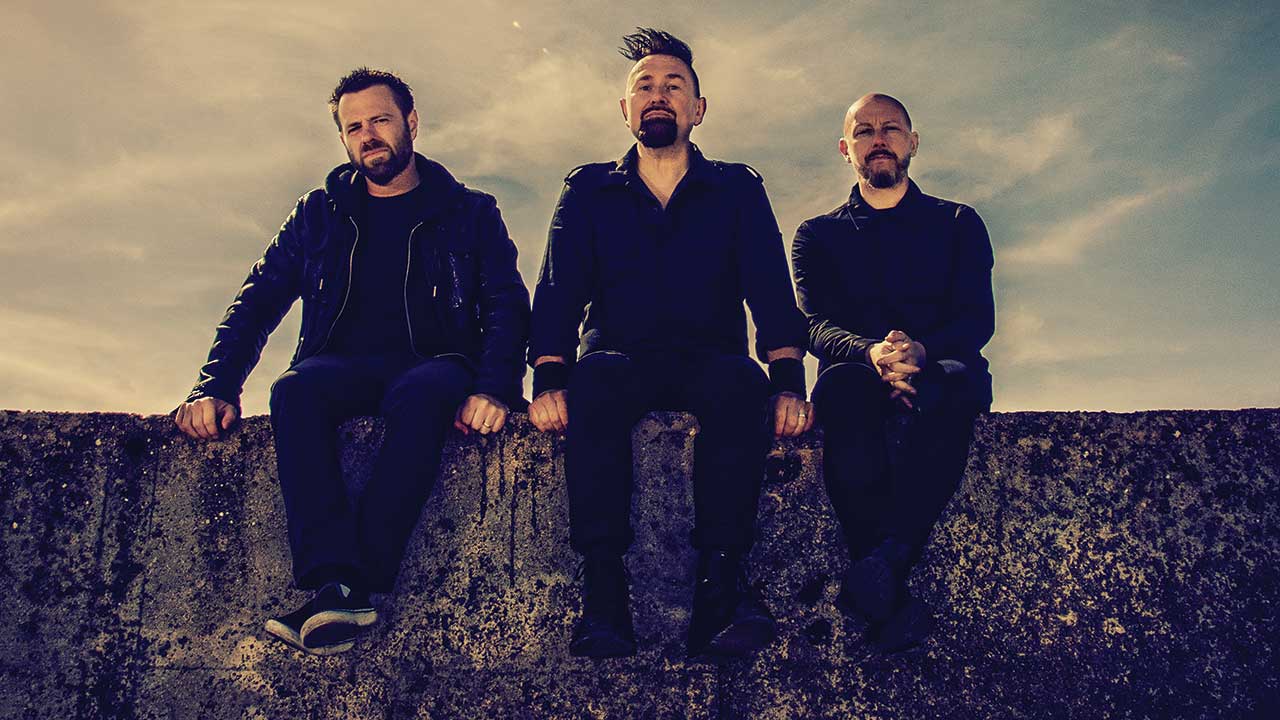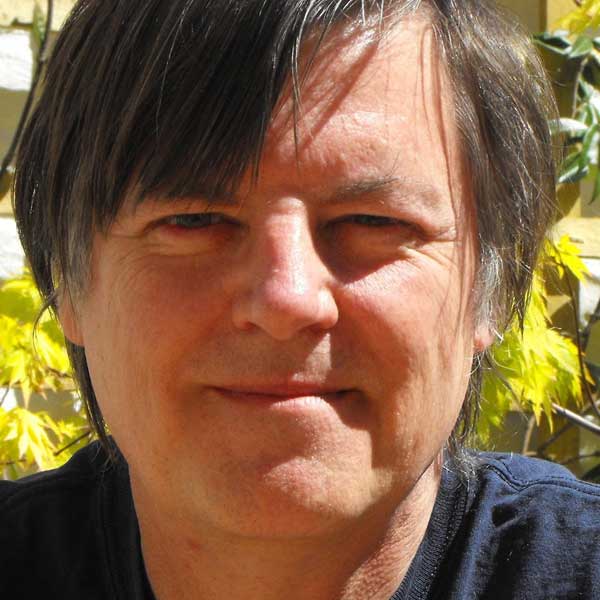Now well into his 50s, and preparing to celebrate 30 years since Therapy?’s first release, frontman Andy Cairns ponders what went right. “I think what has saved us, to an extent,” he says, “is that none of us have ever had any great desire to play golf with Simon Cowell.”
It’s an interesting thought, and one he expands on: “Our best-known song is Screamager, and it starts with the line: ‘With a face like this you won’t break any hearts.’ I knew I wasn’t going to be Jon Bon Jovi, I never went to drama school, I never wanted to go into acting or be on television. I grew up in punk and noise music, and I just wanted to be a musician and play live.”
Fittingly, that’s pretty much what Therapy? have done to commemorate three decades of making records. For Greatest Hits (2020 Versions), the redoubtable trio re-recorded 12 singles from their 90s pomp, live in the storied Abbey Road studios in London. It’s a feisty testament to the enduring power of a band that still sound fearsomely potent as they enter their fourth decade.
The album comes with a bonus CD of rare live tracks, including a song from each of their 15 studio albums, which reflects what a long and varied career has been carved out by a band that’s thrived on creative restlessness. The road is the habitat in which they’ve always felt most at home, Cairns reckons, and something that helped imbue the Greatest Hits recordings with such a keen sense of urgency.
“Making this record didn’t feel like hard work at all,” Cairns says, “because we love playing live. It always surprises me quite how many musicians I know who absolutely despise playing live. But before we had any success we were a touring noisy punk rock band from Ireland that did a load of tiny little gigs, so I suppose that’s in our DNA.”

When he talks about Therapy?’s origins as a live band, he’s actually going back slightly more than 30 years. After Cairns began rehearsing with drummer Fyfe Ewing at the latter’s home in Larne, Northern Ireland in 1989, Ewing’s bass-playing schoolfriend Michael McKeegan was invited to join them.
A string of live shows across Northern Ireland, backed up by a couple of highly promising demos, convinced them to record a single. And despite their links to the anarchic, hedonistic world of punk rock, already their approach was one of rigorous professionalism.
“There was a lot of drinking, taking a lot of speed… and this was eighty-nine, ninety, when ecstasy had just hit Northern Ireland,” McKeegan recalls. “We would stay up all night, jamming, and take crates of beers into the studio. Then after eight beers we’d wonder why we can’t nail that song. But it suited the music we were into – bands like Loop who did that hypnotic, droney, repetitive thing.”
“I didn’t write or play when I was tripping, cos I found it impossible,” Cairns admits. “But afterwards it had an effect. Alot of the early stuff I wrote came partly from acid trips. Innocent X off the first album, bits of Meat Abstract, Fantasy Bag… they all came from acid. I was reading things like Jay Stevens’s [history of LSD] Storming Heaven, and listening to Scratch Acid and Bongwater, so doing acid made a lot of sense. That’s what we used to get out of our shells on those early records.”
Two albums on London indie label Wiiija – Babyteeth (1991) and Pleasure Death (1992) – followed, blueprinting Therapy?’s gnarly brand of industrial-edged, metal-reinforced turbopunk, replete with lyrics shot through with psychodramatic angst and unhealthy obsessions, laced with a distinctive black humour.
Relentless touring, sessions on John Peel and support slots with the likes of Babes In Toyland, Fugazi and Loop meant the band’s profile continued to grow, and in the summer of 1992 they signed to major label A&M – to the extreme disapproval of parts of their fan base.
“It was bizarre,” says McKeegan. “People were really angry, like we’d done a terrible murder. We just wanted to have a van that didn’t break down every other day, amps that didn’t blow up on fire halfway through the gig, and to be able to buy new strings. And we had a grasp of what was needed to develop the band.”
Cairns also believes that elements of traditional hard rock in Therapy?’s sound also caused suspicion as to the nature of the band’s ambitions. “When we started,” he says, “the fall-out from John Robb’s Death To Trad Rock movement meant that anything with heavy rock leanings was regarded as suspicious. Yet for us it didn’t come from eighties cock-rock, it came from things like Discharge.”
Either way, Therapy?’s first two albums for A&M Records, Nurse (1993) and Troublegum (1994), suggested that emulating Kiss and Poison was not, in fact, part of the band’s master plan. There was a visceral edge to Therapy?’s sound that even echoed hardcore techno on classic tracks such as Teethgrinder, while anthems to adolescent dysfunction, such as Screamager, were shoutalongs with sharp claws rather than radio-friendly unit shifters.
Meanwhile, the theme of battling a rising sense of insanity continued to be shot through Cairns’s lyrics. Was that from personal experience, or grim fascination?
“I think on the early records it was more of an objective narrative,” he admits, “the result of my obsession with [infamous murderer] Charles Manson documentaries. Later on it became more personal. But with hindsight I also think it was a Northern Irish thing – growing up in a country that was a bit of a mongrel nation, as a mixed-religion band with none of us caring about sectarian politics.
"And yet everyone prejudged you as soon as you opened your mouth. I know it’s a horrible cliché, but music saved my life. It got me through my teenage years. And although there was this dark humour because of our self-consciousness, the seeds of songs are from a place of great discomfort.”
No pain, no gain, though, and Troublegum would prove to be a commercial and creative high-water mark for Therapy? Yet not long after, Britpop would take an ever-tighter stranglehold on British guitar music and the airplay it got, meaning there was a certain amount of pressure on Cairns, Ewing and McKeegan to remind the world that Therapy? were still relevant.
“[1995 album] Infernal Love was rush-released,” says Cairns, “because the record company saw what was happening with Britpop and they were thinking: ‘Let’s get another record out before it all goes off the boil.’”
Therapy?’s associations with heavier, more American styles of music didn’t immediately fit with emerging trends, but Cairns feels they were unfairly dismissed.
“There was a narrative that we were a traditional rock band. And yet Infernal Love starts with a song in five/four with a free-jazz middle eight, and bits of pieces influenced by Gang Of Four and people – it’s not Saxon! The huge irony being that people who liked The Bluetones and Menswear – basically traditional pop music – were cross at us for making traditional heavy metal, which was pretty far off the mark.
Meanwhile, because they were from Northern Ireland, people used the success of Ash – who were friends of ours – as a stick to beat us with. One headline was: ‘Ash – the Therapy? you could conceivably snog!’”
The more rock-friendly wing of Therapy?’s following stayed loyal, though, snogs or no snogs. The only trouble was that drummer Fyfe Ewing had grown tired of their heavy touring schedule and was creating an uncomfortable vibe within the set-up.
“It was a big relief when he left, in truth,” says McKeegan. “The atmosphere had become toxic.”
“It was passive-aggressive,” says Cairns. “Nothing was ever said and it would be bottled up… until two a.m. at a services in Austria. I’d rather have a fist fight in the car park every third night and be getting stuff done. Fyfe would say he couldn’t stand touring and it wasn’t any fun in the band, when he would always be having such a horrendous time. It was the end of chapter one, I suppose.”

New drummer Graham Hopkins can perhaps be seen as the relationship partner Therapy? chose on the rebound. In contrast to their downcast ex-bandmate, Hopkins proved to be the contrasting, upbeat character the band needed.
Still, it took three years to make 1998 album Semi-Detached, something Cairns has previously blamed on the fact that “the four of us [with touring guitarist/cellist Martin McCarrick by now fully on board] didn’t really gel”.
Singles Church Of Noise and Lonely, Cryin’, Only were powerful, prickly cuts, though, and 1999’s Suicide Pact, You First proved a raging yet revitalised affair after the band, disillusioned after the closure of their label A&M, brought in early PJ Harvey producer Head to reconnect with the sound of their early recordings.
“It was a noise rock record,” says Cairns, “influenced by [Captain Beefheart’s] Clear Spot and [The Stooges’] Fun House. Not a lot of melody, so we knew it would divide people. But it was a record we had to make.”
The pressure to chase prevailing trends was still felt, though, even if it was resisted. As nu metal began to force a backwards baseball cap on to hard rock’s newly shorn head, Therapy? found themselves in two camps, with Andy and Michael determined to resist any such influence and double down on their original template, while Martin and Graham were keen to “update” the band’s sound.
Something had to give, and after 2001’s underwhelming Shameless, Hopkins departed and in came former Beyond drummer Neil Cooper, whose band Therapy? had supported way back in 1990.
After the polished metallic finish of 2003’s High Anxiety album, the decision was taken to part company with McCarrick and revert to the three-piece line-up that has been in place ever since.
Never Apologise Never Explain, in 2004, duly had something of the renegade attitude of Suicide Pact, but since then Therapy? have, admirably, been keen not to repeat themselves. Crooked Timber (2009), for example, benefitted from the experiment-friendly production of Gang Of Four guitarist Andy Gill (recently deceased).
Cooper was particularly impressed with how much he got out of the rhythm section: “Andy had an approach I’d never seen before, where he would record the drums with no cymbals, then the cymbals over the top of the drums. It was a complete head-fuck for me, but the drums sound so massive on that record.”
The intensity has remained high across the three albums since. Cleave (2018) was a short, snappy affair that suggested the band had no intention of mellowing into middle age, and the fired-up performances on Greatest Hits (2020 Versions) back up that impression.
A new studio album is planned for later this year or early next, and according to Cairns they’re already chomping at the bit.
“A lot of musicians we grew up with did that thing where they split up and went away and didn’t make any music, then they get back together, but myself and Michael and Neil have just kept doing it. Even when I’m sat at home, I can’t imagine not being a few weeks away from getting together again and rehearsing.”
Thirty more years, then? Maybe not. But is there ever a time when you can say you’ve had enough Therapy?

